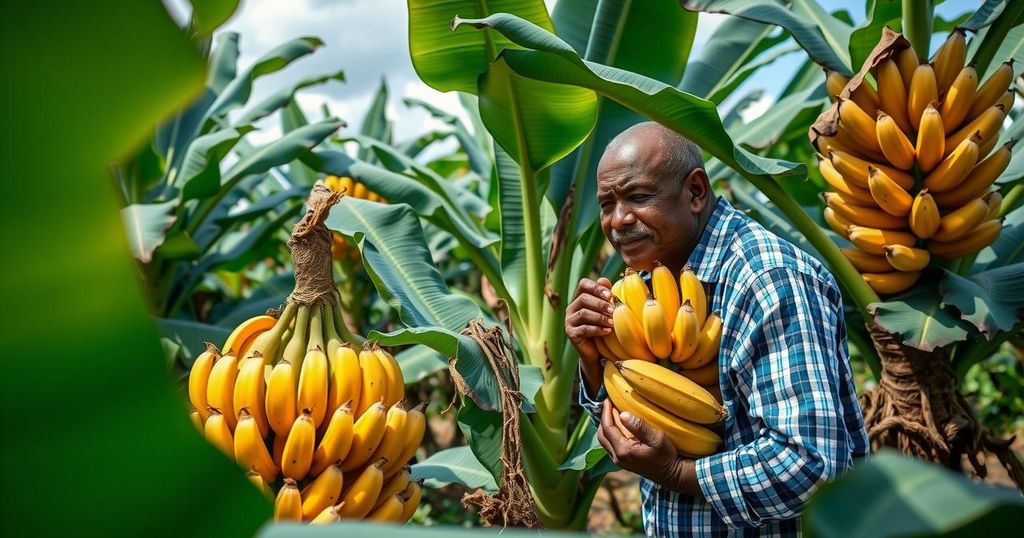Innovative Crop Insurance: A Lifeline for Uganda’s Banana Farmers Against Climate Change

Extreme weather in Uganda has devastated banana farmers like Ahumwire Justine, revealing their vulnerability to climate change. The NDC Action Project aims to provide support through crop insurance and agricultural training, enhancing resilience for 5,000 farmers initially, with plans to expand to 50,000. This initiative has introduced technology to streamline claims processes, thus reducing insurance premiums and boosting productivity. This comprehensive support is crucial for Ugandan farmers striving to adapt to a changing climate.
In Uganda’s southwest, banana farmer Ahumwire Justine faced a life-altering challenge last October when a severe rain and hailstorm ravaged her crops, destroying 300 banana trees and claiming the lives of two cows. The impact was devastating, leaving her family to contemplate leaving their unprotected two-hectare farm due to their dire financial situation. “We had no food, no money for school fees for my children and no food for my animals,” stated Justine, a mother of four. Weather extremes in Uganda are on the rise, attributed to climate change, as confirmed by the Intergovernmental Panel on Climate Change. Responding to this crisis, the NDC Action Project – a collaborative effort of the United Nations Environment Programme (UNEP) and the UNEP Copenhagen Climate Centre – is designed to protect farmers like Justine from the escalating menace of extreme weather. Mirey Atallah, Chief of the Adaptation and Resilience Branch within UNEP’s Climate Change Division, remarked, “We know farmers, particularly smallholders, are struggling to adapt to the effects of the climate crisis. That’s why projects that combine technical and financial instruments such as these are so important. They increase resilience and ensure that extreme weather does not have to be catastrophic for farmers.” Bananas are a cornerstone of Uganda’s agricultural economy, with 47 percent of farmers involved in their cultivation as of 2019, per data from Uganda’s statistics bureau. Beyond food supply, bananas provide materials such as fibers for ropes and mats, with leaves utilized for various packaging purposes. However, the future remains precarious for banana farmers due to climate volatility. According to the Ugandan government, the last fifteen years have witnessed increasingly unpredictable weather patterns, characterized by alternating phases of drought and intense rainfall. Florence Muranga, Director of the Banana Industrial Research and Development Centre, a non-governmental organization, noted, “We could have two years of non-stop rain, and then six months with no rain at all. [Farmers] can lose their food, their livelihood, their house in one day.” Under her leadership, the centre, which represents 5,000 banana farmers, has been pivotal in UNEP’s initiative to enhance crop insurance access. The project trained an initial cohort of 930 banana farmers to utilize smartphones for documenting their banana crop conditions via a digital platform. In the event of a storm, farmers can upload images of damage, which are assessed by agroeconomists associated with the insurance firm to validate losses. Remarkably, almost half of the participating farmers are women, demonstrating a commitment to inclusivity. Despite initial challenges in smartphone usage, designated ‘Champion farmers,’ such as Justine, guide fellow farmers in navigating the technology. Agriculture and Climate Risk Enterprise Africa, a partner in the project, links smallholder farmers to insurance providers through Agro Consortium Limited, a coalition of thirteen insurance companies. The digital nature of the insurance claims process minimizes in-person assessments, expediting payouts and reducing premium costs. Additionally, farmers receive training in water management and agroforestry practices, significantly enhancing productivity and curbing climate-related losses. These advancements decrease insurers’ risk while also facilitating access to loans from financial institutions. Due to the success of the pilot project, efforts will now focus on extending this insurance program to all 5,000 farmers represented by the Banana Industrial Research and Development Centre, with future aspirations to encompass an additional 50,000 banana farmers across Uganda. For Justine, the insurance provides a crucial sense of security: “I know that if [my crops get damaged] I have help. It’s not like in other years, where I would have to start from zero.” The United Nations Environment Programme remains a pivotal player in the global initiative to meet the Paris Agreement goals of limiting global temperature increases to below 2°C, aiming for a maximum of 1.5°C above pre-industrial levels. UNEP’s Sectoral Solution offers a comprehensive roadmap for emissions reductions across various sectors, including agriculture, aligning with climate stabilization efforts.
The rising frequency of extreme weather events in Uganda poses significant challenges for its agricultural sector, particularly for banana farmers who form a substantial part of the economy. Financial insecurity resulting from crop failures due to unpredictable climate patterns leads many farmers to reconsider their agricultural viability. In response, initiatives such as the NDC Action Project have been implemented to combine technological and financial support, providing farmers with insurance to mitigate the damage caused by extreme weather conditions. This approach empowers farmers by not only safeguarding their yields but also enhancing their overall resilience against climate impacts.
The introduction of innovative crop insurance linked to a digital platform marks a significant advancement for Uganda’s banana farmers, providing them with a vital safety net in the face of climate-induced challenges. As this program expands, it not only aids farmers like Justine in maintaining their livelihoods but also empowers them with resources and knowledge to adapt to a changing climate. The ongoing efforts of organizations such as UNEP and local agricultural support centers signify a promising path forward for sustaining Uganda’s essential banana industry amid ongoing environmental threats.
Original Source: www.unep.org






